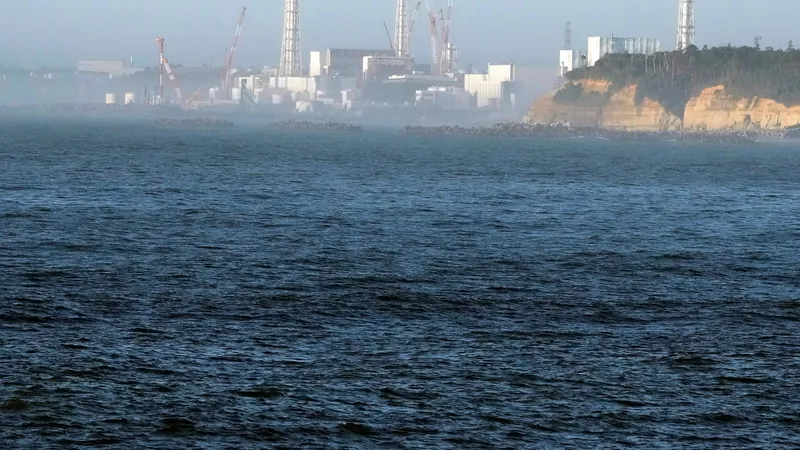
Japan's Bold Nuclear Ambitions: A Clean Energy Future Amid Rising Demand!
2024-12-25
Author: Ting
Japan's Bold Nuclear Ambitions: A Clean Energy Future Amid Rising Demand!
In a groundbreaking decision, Japan is set to reshape its energy landscape as it grapples with increasing electricity demands and the pressing need for sustainable practices. A government-commissioned panel of experts has recently endorsed a new energy policy that seeks to significantly ramp up the use of renewable energy sources while simultaneously revitalizing the nation's nuclear power sector. This ambitious strategy comes as Japan aims to support growing energy requirements, especially with the rise of AI technologies and data centers.
The Industry Ministry presented the draft of this plan to a panel comprised mostly of pro-nuclear advocates from various sectors, including business, academia, and civil organizations. The proposal aims to pivot away from the phaseout of nuclear power that was instigated by the devastating Fukushima Daiichi disaster in 2011, which has left a lasting impact on public sentiment regarding nuclear energy in Japan.
Set to be approved by the Cabinet by March, this new energy framework will replace the existing policy established in 2021. The goal? To ensure that nuclear power contributes to 20% of Japan's energy supply by 2040—up from a mere 8.5% in the previous year. Interestingly, the plan also sets an ambitious target for renewable energy to account for 40-50% of the energy mix by 2040, significantly increasing from 22.9%, while also pledging to reduce coal dependency from nearly 70% to 30-40%.
For the year 2030, the current energy plan targeted 20-22% nuclear energy, along with 36-38% renewables and 41% fossil fuels. As Japan continues to expand its energy infrastructure to accommodate the demands of AI growth and semiconductor factories, the call for low-carbon energy sources, including nuclear and renewables, could not be more crucial.
Industry Minister Yoji Muto emphasized the importance of diversifying energy sources. "How we can secure decarbonized energy determines Japan’s future growth," he stated. "It’s time to stop discussing a choice between renewable energy and nuclear power; we should maximize both."
Japan has set an ambitious target of achieving net-zero emissions by 2050, aiming for a 73% reduction in climate-warming gas emissions by 2040 compared to 2013 levels. The proposed energy strategy highlights renewable sources as primary power contributors and encourages the development of next-generation technologies, including solar batteries and portable solar panels.
Nonetheless, the strategy does not come without its challenges. Experts have cautioned that the plan lacks a robust feasibility outlook for 2040 as well as a clear roadmap for phasing out fossil fuels. Additionally, the push to restart reactors that comply with updated safety standards post-Fukushima is included in the proposal, alongside plans for constructing new next-generation reactors at sites where older reactors are decommissioned.
However, the path to meeting the 20% nuclear power target is steep. Japan has 33 operational reactors, but only 14 are currently online, with stringent safety checks conducted by the regulatory authority posing an additional hurdle to progress.
Despite skepticism surrounding the practicality of this energy vision, Japan remains steadfast in its pursuit of advanced nuclear technologies and is keen on enhancing its spent fuel reprocessing programs, all in a bid to realize an effective nuclear fuel cycle.
As Japan embarks on this crucial energy journey, the world watches closely—can Japan truly balance the dual forces of renewable energy and nuclear power to secure a sustainable, low-carbon future? Only time will tell, but one thing is clear: the stakes have never been higher!

 Brasil (PT)
Brasil (PT)
 Canada (EN)
Canada (EN)
 Chile (ES)
Chile (ES)
 España (ES)
España (ES)
 France (FR)
France (FR)
 Hong Kong (EN)
Hong Kong (EN)
 Italia (IT)
Italia (IT)
 日本 (JA)
日本 (JA)
 Magyarország (HU)
Magyarország (HU)
 Norge (NO)
Norge (NO)
 Polska (PL)
Polska (PL)
 Schweiz (DE)
Schweiz (DE)
 Singapore (EN)
Singapore (EN)
 Sverige (SV)
Sverige (SV)
 Suomi (FI)
Suomi (FI)
 Türkiye (TR)
Türkiye (TR)